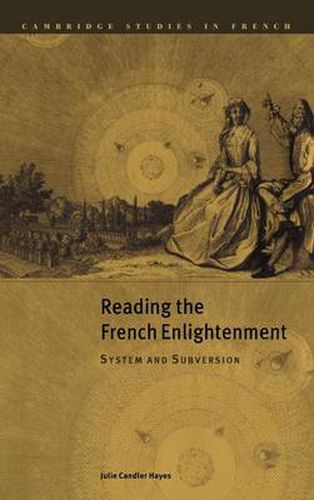Readings Newsletter
Become a Readings Member to make your shopping experience even easier.
Sign in or sign up for free!
You’re not far away from qualifying for FREE standard shipping within Australia
You’ve qualified for FREE standard shipping within Australia
The cart is loading…






Julie Candler Hayes offers an ambitious reinterpretation of a crucial aspect of Enlightenment thought, the rationalizing and classifying impulse. Taking issue both with traditional liberal and contemporary critical accounts of the Enlightenment, she analyzes the writings of Denis Diderot, Emilie Du Chatelet, the Abbe de Condillac, Buffon, d'Alembert, and numerous others, to argue for a new understanding of ‘systematic reason’ as complex, paradoxical, and ultimately liberating. Hayes examines the tensions between freedom and constraint, abstraction and materialism, linear and synoptic order, that pervade not only philosophic and scientific discourse, but also epistolary writing, fiction, and criticism. Drawing on the insights of a wide range of theorists from Adorno, Habermas, and Foucault to Deleuze and Derrida, she offers a dialogue between the eighteenth century and our own, an ongoing exploration of the question, ‘what is Enlightenment?
$9.00 standard shipping within Australia
FREE standard shipping within Australia for orders over $100.00
Express & International shipping calculated at checkout
Julie Candler Hayes offers an ambitious reinterpretation of a crucial aspect of Enlightenment thought, the rationalizing and classifying impulse. Taking issue both with traditional liberal and contemporary critical accounts of the Enlightenment, she analyzes the writings of Denis Diderot, Emilie Du Chatelet, the Abbe de Condillac, Buffon, d'Alembert, and numerous others, to argue for a new understanding of ‘systematic reason’ as complex, paradoxical, and ultimately liberating. Hayes examines the tensions between freedom and constraint, abstraction and materialism, linear and synoptic order, that pervade not only philosophic and scientific discourse, but also epistolary writing, fiction, and criticism. Drawing on the insights of a wide range of theorists from Adorno, Habermas, and Foucault to Deleuze and Derrida, she offers a dialogue between the eighteenth century and our own, an ongoing exploration of the question, ‘what is Enlightenment?